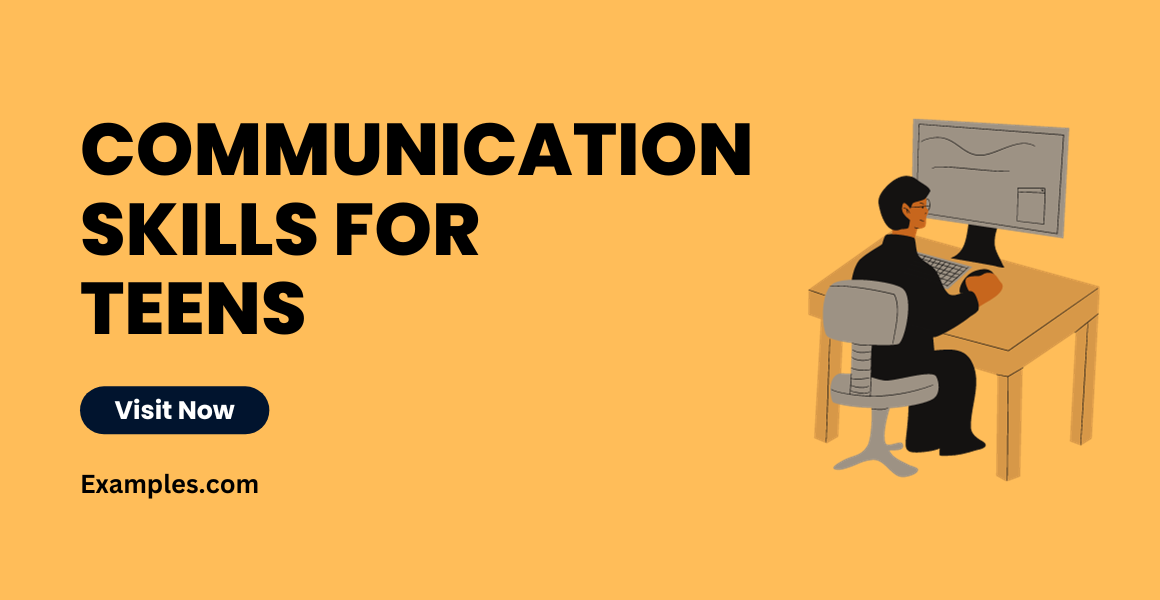24+ Communication Skills for Teens Examples
Navigating the teenage years can be challenging, and effective communication skills are key to a teen’s success and well-being. This comprehensive guide delves into essential communication skills for teens, providing practical advice and real-life communication examples. From expressing emotions healthily to understanding non-verbal cues and digital communication etiquette, this guide equips teens with the tools to articulate their thoughts and feelings confidently and build positive relationships in both their personal and academic lives.
25 Communication Skills for Teens Examples
In today’s interconnected world, effective communication is crucial for teens. This collection of 30 unique examples highlights various aspects of communication skills, crucial for teenagers to thrive in personal, educational, and social settings. Each example provides insight into how teens can communicate effectively, demonstrating techniques in active listening, empathetic responses, and assertive expression. These examples serve as practical guides to help teens navigate complex conversations and build strong, positive relationships.
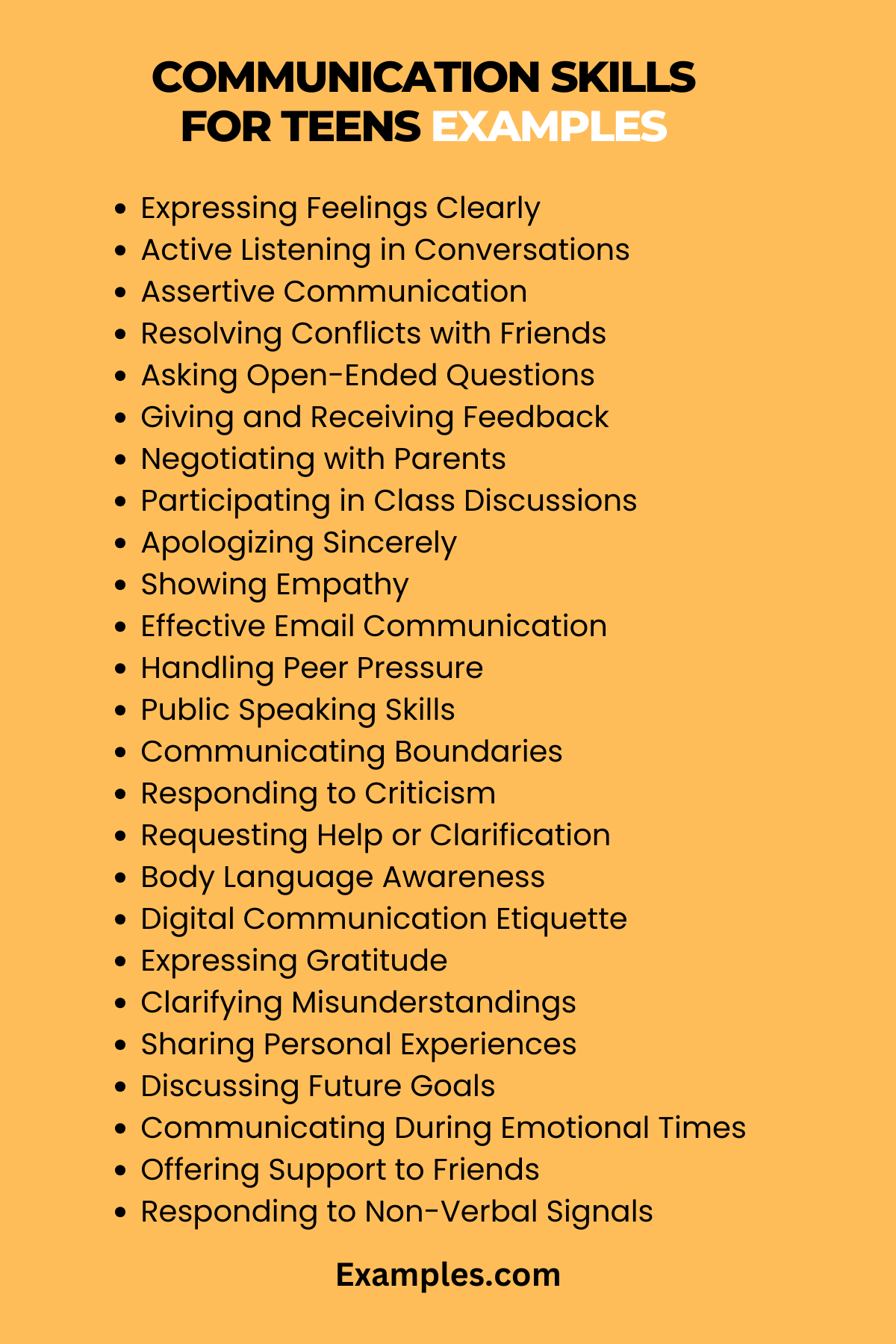
- Expressing Feelings Clearly: “I feel stressed when I have too much homework and need some help to manage it.”
Teaches teens to express emotions clearly without blaming others. - Active Listening in Conversations: “So, what you’re saying is that you’re upset about the test score, right?”
Encourages teens to listen actively and confirm understanding. - Assertive Communication: “I would appreciate it if I could have some time to myself this evening.”
Demonstrates how to state needs assertively and respectfully. - Resolving Conflicts with Friends: “I understand your point, but I felt hurt when you canceled our plans last minute.”
Shows how to address issues without escalating conflicts. - Asking Open-Ended Questions: “What are your thoughts on the new school policy?”
Encourages deeper conversation and understanding. - Giving and Receiving Feedback: “I like how you presented your project, maybe next time try adding more examples.”
Teaches constructive ways to give and receive feedback. - Negotiating with Parents: “Can we discuss extending my curfew on weekends? I feel I am responsible enough.”
Encourages reasonable negotiation and compromise.
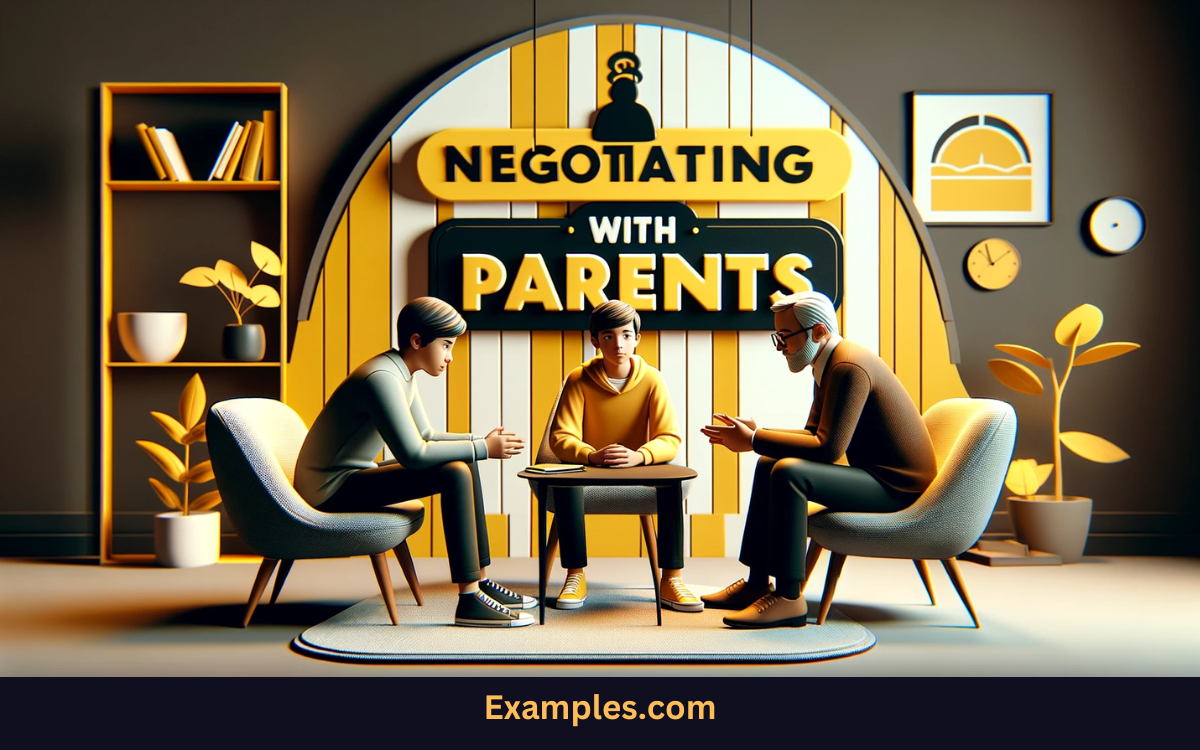
- Participating in Class Discussions: “I have a different perspective on the book we read. Here’s my view…”
Promotes active and thoughtful participation in academic settings.
- Apologizing Sincerely: “I’m sorry for forgetting your birthday, I’ll make it up to you.”
Illustrates taking responsibility and making amends.
- Showing Empathy: “It sounds like you had a tough day. Do you want to talk about it?”
Demonstrates understanding and concern for others’ feelings. - Effective Email Communication: “Dear Mr. Smith, I’m emailing to inquire about the extra credit assignment due dates.”
Highlights formal and clear email communication. - Handling Peer Pressure: “I understand why you all want to go, but I’m not comfortable with that plan.”
Shows standing up for personal beliefs respectfully. - Public Speaking Skills: “Today, I want to share a topic that’s important to me. Let’s talk about…”
Demonstrates confident and organized public speaking. - Communicating Boundaries: “I don’t like it when you go through my things without asking.”
Expresses personal boundaries clearly and firmly. - Responding to Criticism: “I appreciate your feedback. I’ll work on improving that aspect.”
Shows a positive approach to handling criticism. - Requesting Help or Clarification: “Could you please explain this math problem again? I’m having trouble understanding it.”
Encourages seeking assistance when needed. - Body Language Awareness: Maintaining eye contact and nodding during conversations to show engagement.
Emphasizes the importance of non-verbal cues in communication. - Digital Communication Etiquette: “Hey, just checking in to see how you’re doing ”
Promotes polite and friendly online interactions.

- Expressing Gratitude: “Thank you for helping me with my project, I really appreciate your time.”
Highlights the importance of thanking and acknowledging help.
- Clarifying Misunderstandings: “When I said that, I didn’t mean to offend you. What I meant was…”
Shows addressing and clarifying misunderstandings promptly. - Sharing Personal Experiences: “In my experience, joining the drama club has boosted my confidence.”
Encourages sharing personal stories and experiences. - Discussing Future Goals: “My goal is to study computer science in college. Here’s my plan…”
Demonstrates discussing aspirations and future plans. - Communicating During Emotional Times: “I’m feeling overwhelmed right now; can we talk a bit later?”
Shows how to communicate needs during emotional moments. - Offering Support to Friends: “If you need someone to talk to about your situation, I’m here.”
Shows being supportive and available for friends. - Interpreting and Responding to Non-Verbal Signals: Noticing a friend’s sad face and asking if they are okay.
Teaches reading and responding to non-verbal cues.
What are Effective Communication Skills for Teens?
Effective communication skills are crucial for teens as they navigate through various stages of their personal and academic life. These skills help them express their thoughts and feelings clearly, understand others, and build strong relationships. Mastering these skills can lead to improved self-confidence and better interactions in both personal and professional settings.
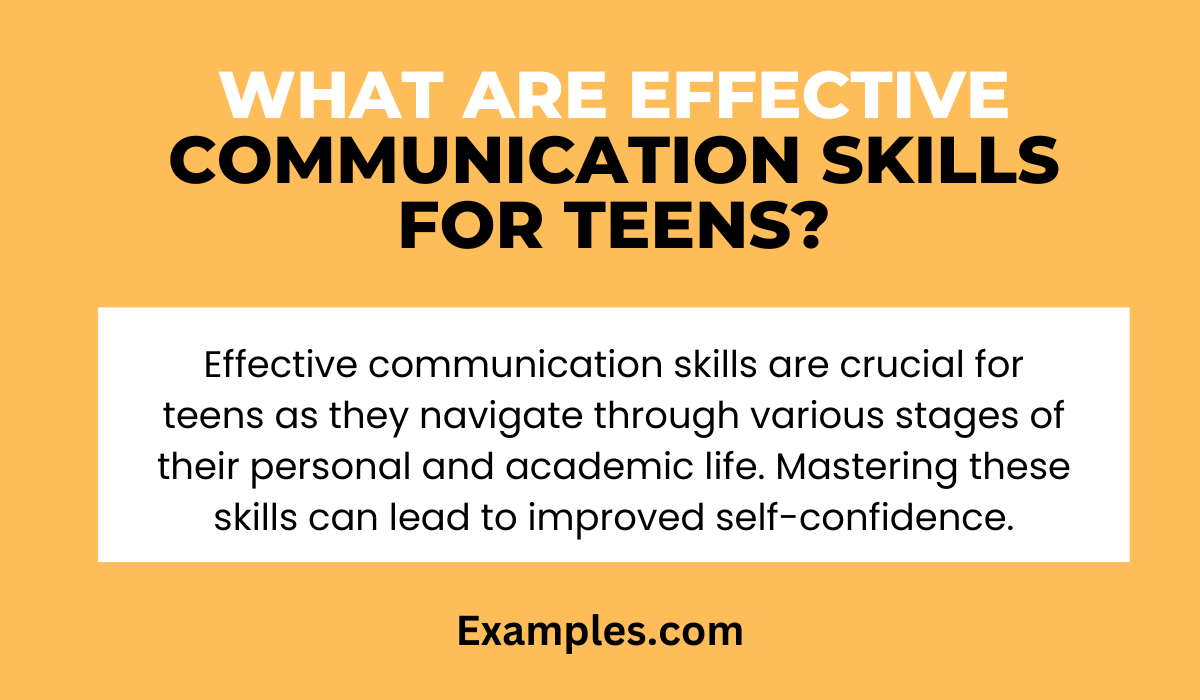
Understanding Communication Skills
Effective communication skills are vital for teens, as they navigate through their formative years. These skills involve the ability to express thoughts, emotions, and ideas clearly and respectfully. It is about understanding and being understood. Effective communication is a two-way process, involving both speaking and listening. For teens, developing these skills is crucial for building strong relationships, succeeding in education, and preparing for the challenges of adulthood.
The Importance of Active Listening
Active listening is a key component of effective communication. It involves fully concentrating, understanding, responding, and remembering what is being said. For teens, active listening means more than just hearing words; it’s about understanding the message behind them. This skill helps in building rapport and trust with others, be it friends, family, or teachers. Active listening also plays a significant role in resolving conflicts and enhancing mutual understanding.
Expressing Yourself Clearly and Respectfully
Clear and respectful expression is another critical aspect of communication skills for teens. This involves choosing words carefully, using appropriate body language, and understanding the impact of tone and volume. Teens should aim to express their opinions and feelings in a way that is honest yet considerate of others’ feelings. This skill is particularly important in today’s digital age, where much communication happens online, and messages can be easily misunderstood.
Non-Verbal Communication: Body Language and Tone
Non-verbal communication, including body language and tone of voice, is an essential part of how we convey messages. For teens, being aware of their body language (like eye contact, facial expressions, and posture) and tone can significantly impact how their message is received. This awareness helps in making sure their non-verbal cues match their words, leading to clearer and more effective communication.
The Role of Empathy in Communication
Empathy, the ability to understand and share the feelings of another, is crucial for effective communication. It helps teens to connect with others on a deeper level. Demonstrating empathy involves actively trying to see things from another person’s perspective and responding with compassion. This skill is particularly important in building and maintaining personal relationships.
Improving Communication through Feedback
Feedback is an essential part of communication. For teens, learning how to give and receive feedback constructively is a valuable skill. It involves being open to suggestions, criticisms, and different viewpoints. Constructive feedback helps teens to grow, learn, and improve their communication skills over time.
The Impact of Digital Communication
In the digital era, teens are often more engaged in online communication than face-to-face interactions. Understanding the nuances of digital communication, such as the use of emojis, tone in texts, and online etiquette, is vital. Teens must learn to convey their messages clearly and respectfully, even when not communicating in person.
Developing Communication Skills: Practice and Patience
Developing effective communication skills takes practice and patience. Teens should seek opportunities to interact with others, engage in conversations, and practice their listening and speaking skills. Participating in group activities, public speaking, or even drama classes can greatly enhance their communication abilities.
Effective communication skills are crucial for teens in building successful relationships and preparing for their future. By mastering these skills, they not only improve their personal interactions but also set a strong foundation for their professional lives. Encouraging and supporting teens in this learning process can lead to more confident and articulate individuals.
What are the Benefits of Communication Skills for Teens?
Effective communication skills are crucial for teenagers, playing a pivotal role in their personal development and future workplace success. These skills are not just about the ability to converse but also include listening, understanding, and the capacity to convey thoughts and emotions clearly.
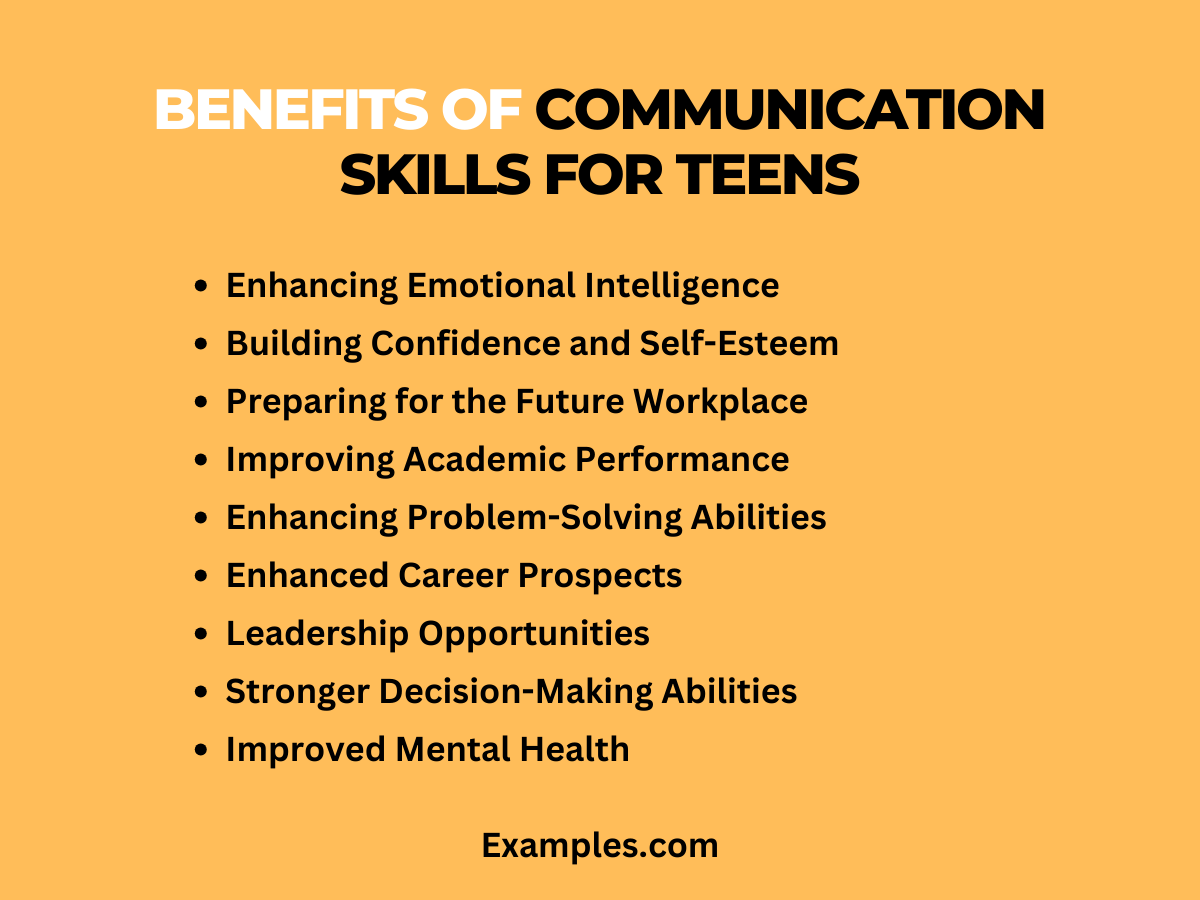
Enhancing Emotional Intelligence
One of the primary benefits of developing strong communication skills in teens is the enhancement of their emotional intelligence. This involves understanding and managing one’s emotions, as well as empathizing with others. Improved emotional intelligence is vital for teens as it helps them navigate social interactions and build healthy relationships, both personally and professionally.
Building Confidence and Self-Esteem
Another significant advantage of good communication skills is the boost in confidence and self-esteem among teenagers. Being able to express themselves effectively helps teens feel more confident in their interactions with others. This increased confidence can lead to greater participation in class discussions, extracurricular activities, and social events, contributing to a well-rounded personality.
Preparing for the Future Workplace
Moreover, communication skills are highly valued in the workplace. Teens who are adept at communicating will find it easier to adapt to different work environments and collaborate effectively with colleagues. These skills are essential for leadership roles and are often a key factor in career advancement.
Improving Academic Performance
Effective communication also has a direct impact on academic performance. Teens with good communication skills tend to participate more in class, understand instructions better, and are more likely to seek help when needed. This active engagement in the learning process can lead to improved grades and a deeper understanding of the subject matter.
Enhancing Problem-Solving Abilities
Lastly, strong communication skills aid in developing better problem-solving abilities. Teens who can communicate effectively are more likely to discuss issues openly, consider different perspectives, and find creative solutions to problems. This skill is invaluable in both personal and professional settings.
The benefits of developing communication skills in teens are far-reaching, impacting their emotional intelligence, self-esteem, preparedness for the workplace, academic success, and problem-solving abilities. These skills lay the foundation for a successful and fulfilling life.
How to Teach Teenagers Communication Skills?
Teaching teenagers communication skills involves a combination of guidance, practice, and positive reinforcement. Here are some effective ways to enhance their communication abilities:
- Model Effective Communication: Teens often learn by observing. Displaying good communication practices, such as active listening, clear articulation, and respectful responses, sets a positive example for them to emulate.
- Encourage Participation in Group Activities: Engaging in team sports, clubs, or group projects can provide practical experience in communicating within a team. These activities teach teens the importance of listening, contributing ideas, and working collaboratively.
- Provide Constructive Feedback: Feedback is crucial in learning. Offer teens constructive criticism on their communication style, emphasizing areas of strength and providing suggestions for improvement.
- Practice Empathy and Emotional Intelligence: Teach teens to understand and respect different perspectives. Role-playing exercises can be an effective tool for practicing empathy and enhancing their emotional intelligence.
- Develop Public Speaking Skills: Encourage teens to participate in public speaking activities, such as debates or presentations. This exposure boosts their confidence and improves their ability to articulate thoughts clearly and effectively.
- Promote Active Listening Skills: Active listening is a key component of effective communication. Encourage teens to listen attentively, ask clarifying questions, and summarize what they’ve heard to ensure understanding.
By integrating these strategies, teens can develop robust communication skills that will benefit them in their personal and professional lives. Remember, the journey to effective communication is ongoing, and consistent practice and reinforcement are key to mastery.
How to Improve Communication Skills in Teenagers
Developing effective communication skills in teenagers is crucial for their personal and professional growth. It lays the foundation for strong relationships and successful careers. By mastering these skills early, teenagers can navigate the complexities of various interactions with confidence and ease.
Practical Steps to Enhance Communication Skills in Teenagers
- Encourage Active Listening: Teach teenagers to listen actively. This means paying full attention to the speaker, understanding their message, and responding thoughtfully. Active listening improves mutual understanding and builds stronger connections.
- Promote Clear Expression: Encourage teenagers to express their thoughts clearly and concisely. This can be done through role-playing activities or public speaking clubs, which provide a safe environment to practice and refine their expression skills.
- Foster Emotional Intelligence: Emotional intelligence is a vital aspect of communication. Guide teenagers to recognize and understand their emotions and those of others. This empathy enhances their ability to communicate effectively in diverse situations.
- Teach Non-Verbal Communication: Non-verbal cues like body language and facial expressions are integral to communication. Educate teenagers on how to read and use these cues to convey and interpret messages accurately.
- Encourage Written Communication: In the digital age, written communication is as important as verbal. Engaging in activities like writing essays, emails, or even text messaging can sharpen their ability to convey ideas in writing.
- Provide Constructive Feedback: Offer regular, constructive feedback on their communication efforts. This feedback should highlight both strengths and areas for improvement, fostering a continuous learning process.
- Model Effective Communication: As role models, parents and educators should demonstrate good communication practices. This modeling provides teenagers with a real-life framework to emulate.
Improving communication skills in teenagers involves a comprehensive approach encompassing active listening, clear expression, emotional intelligence, understanding non-verbal cues, written communication practice, constructive feedback, and positive modeling. These skills are essential for personal development and future professional success.
Tips to Build Healthy Communication Skills for Teens
Communication skills are crucial for teenagers as they navigate through significant stages of their life. Developing effective communication not only aids in academic and social settings but also sets the foundation for future professional success. Here are some tips to help teens build healthy communication skills:
Understand the Importance of Listening
Active listening is a key component of effective communication. Encourage teens to listen attentively to others, showing respect and understanding. This empathetic listening can greatly improve interpersonal relationships.
Practice Clear and Concise Speaking
Teens should learn to convey their thoughts and feelings clearly and concisely. This involves choosing words carefully and being mindful of their tone and body language. Verbal communication skills are essential in expressing oneself effectively.
Develop Empathy
Understanding others’ perspectives and emotions is crucial in communication. Encourage teens to put themselves in others’ shoes to foster empathy. This can lead to more meaningful and respectful conversations.
Encourage Open-Mindedness
Being open to different viewpoints enhances communication. Teens should be encouraged to approach conversations with an open mind, ready to learn and grow from the interaction.
Build Confidence
Confidence plays a significant role in communication. Encouraging teens to speak up and express themselves can boost their self-esteem and improve their overall communication skills.
Seek Feedback and Practice
Regular practice and seeking feedback can help teens refine their communication skills. Whether it’s through public speaking, group discussions, or one-on-one conversations, practical experience is invaluable.
By focusing on these areas, teens can develop strong communication skills that will benefit them in various aspects of their lives, from personal relationships to future professional environments.



